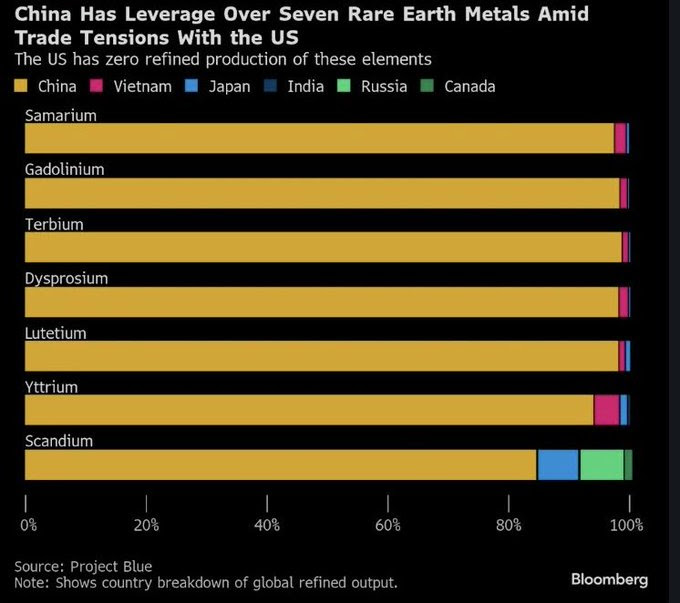Trump announces 100% tariff on all Chinese imports after Beijing restricts key rare earth minerals.
Sectors & Industries
Table of Contents
The U.S. government reignited tensions with China on Friday, accusing Beijing of becoming “very hostile” after China announced sweeping restrictions on exports of rare earth minerals — materials essential to everything from computer chips and electric vehicles to missiles and clean energy systems. The new rules require companies worldwide to get Chinese approval before shipping products that contain even trace amounts of these elements, effectively giving Beijing control over a critical link in the global supply chain.
Breakdown: China’s Newly Restricted Rare Earths
China’s decision immediately tanked the global technology sector. The restrictions could delay shipments for chip equipment makers like Applied Materials (AMAT) and raise costs for semiconductor producers such as Nvidia (NVDA) and Intel (INTC) that depend on magnets and other components containing these minerals. Prices for neodymium, dysprosium, and terbium are already expected to climb, raising costs across electronics and defense manufacturing.
Within hours, Trump responded by announcing an additional 100% tariff on all Chinese imports starting November 1, along with new export controls on “any and all critical software.” He called China’s actions an effort to “hold the world captive” and warned he might cancel his meeting with President Xi Jinping if the restrictions remain.
Markets sold off sharply on the news — the S&P 500 fell 2.7%, the Nasdaq dropped 3.5%, and soybean futures slid nearly 2%. Technology and semiconductor stocks led the decline, while gold and silver climbed as investors sought safety.
Trump’s move marks the sharpest trade escalation since 2019, hitting just as the government shutdown stalls economic data. With trade, data, and manufacturing all under strain, investors face a new period of uncertainty — one where energy, defense, and domestic mining may rise, while tech and global supply chains come under pressure.

Join LevelFields now to be the first to know about events that affect stock prices and uncover unique investment opportunities. Choose from events, view price reactions, and set event alerts with our AI-powered platform. Don't miss out on daily opportunities from 6,300 companies monitored 24/7. Act on facts, not opinions, and let LevelFields help you become a better trader.

AI scans for events proven to impact stock prices, so you don't have to.
LEARN MORE